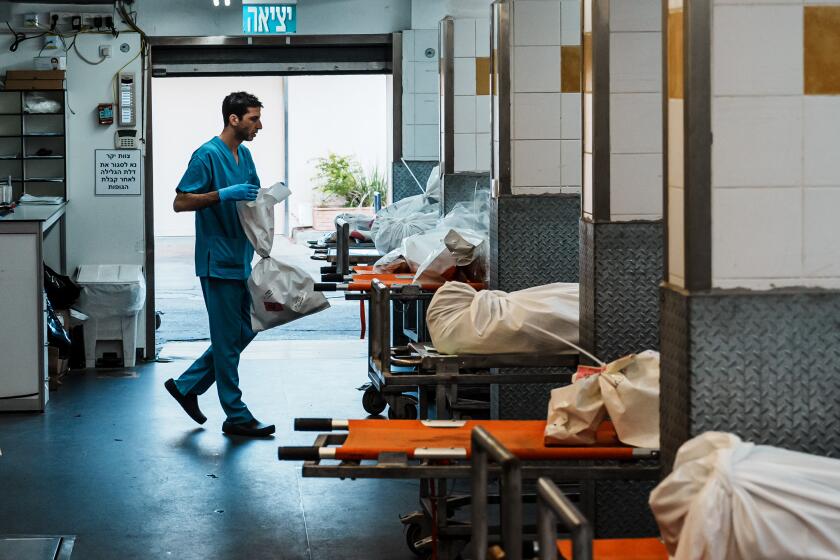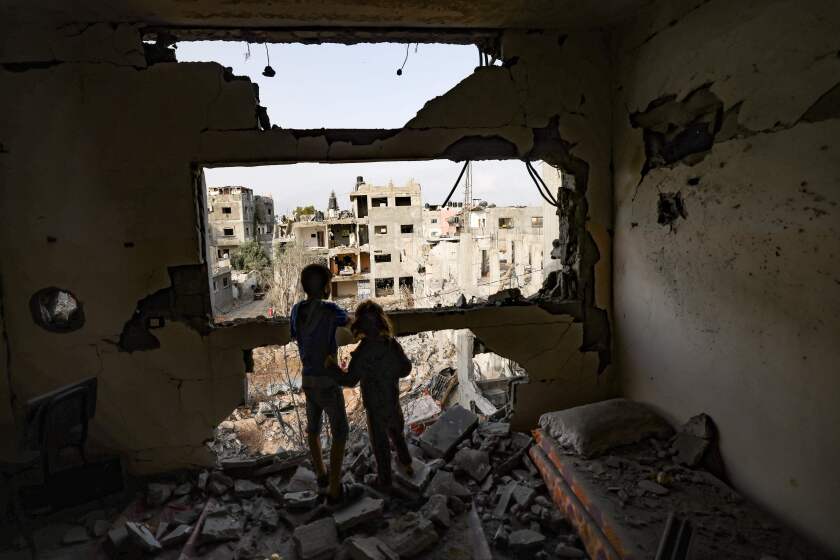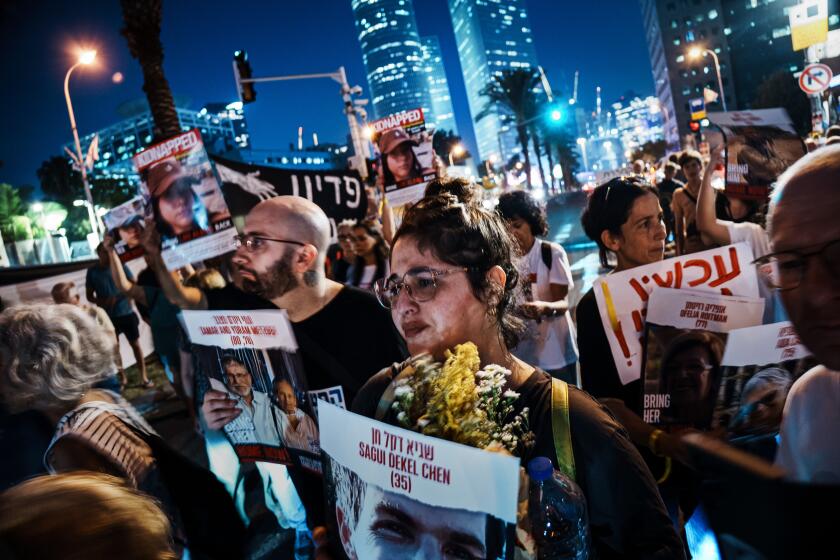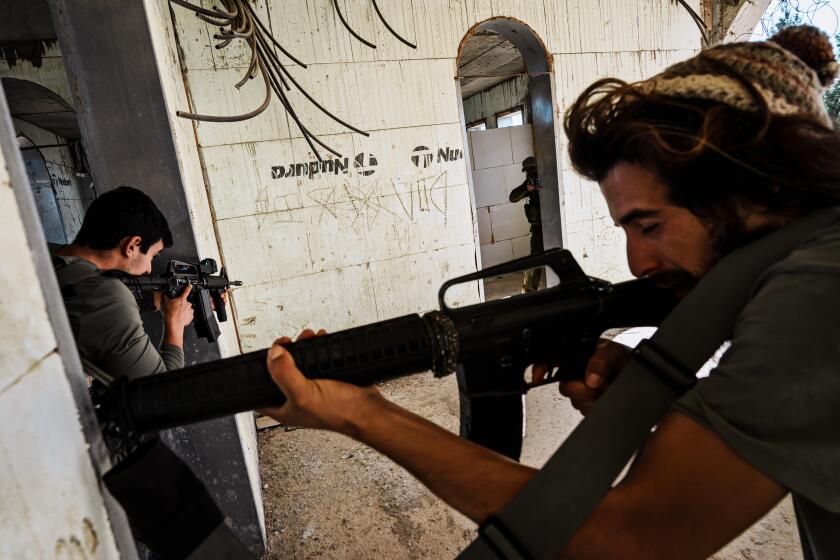Israel, Hamas agree to temporary cease-fire to free 50 hostages
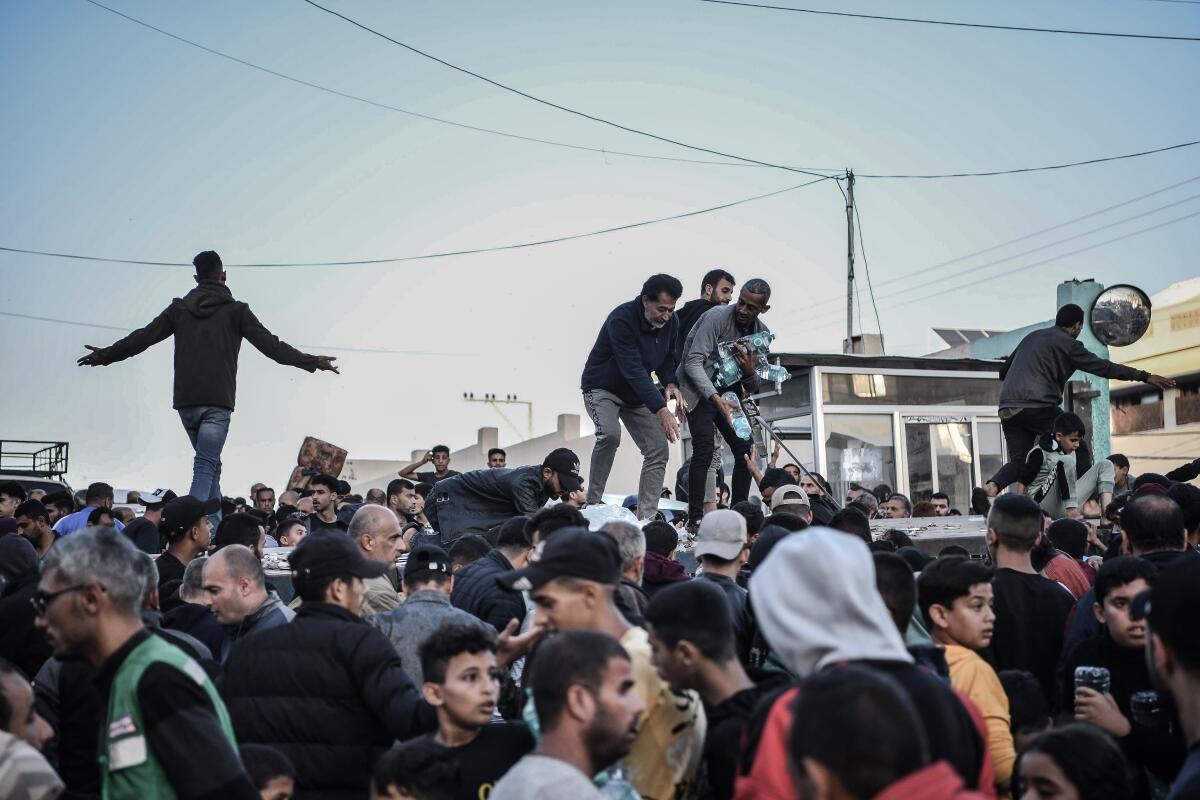
- Share via
TEL AVIV — Israel and Hamas said they have agreed on a temporary truce that would suspend their 47-day war to allow the release of 50 women and children kidnapped by Hamas in exchange for a group of Palestinian prisoners held by Israel.
The move calls for a pause in fighting in a war that began when Hamas attacked Israel on Oct. 7 and — according to tallies from each side — has killed more than 14,270 people, mostly Palestinians. Ten hostages will be released on each day of the truce, Israeli officials said.
Although some details remain undisclosed, the deal — brokered by Qatari, Egyptian and U.S. senior leaders as well as diplomats in tense, on-and-off-again talks — is expected to slow Israel’s invasion and bombing of Gaza while pausing a war that threatens to consume the Middle East and spread to Iran and Lebanon, where Hezbollah fighters have been shelling northern Israel for weeks.
Final steps to approve the deal came in marathon sessions of the Israeli war and security Cabinets that began Tuesday and dragged into Wednesday. The most hard-line right-wing members of the government opposed any agreement with Hamas.
The deal was secured after what one senior Biden administration official late Tuesday called “gut-wrenching” and “excruciating” negotiations that required frequent telephone calls involving President Biden; the emir of Qatar, Sheikh Tamim bin Hamad al Thani; and Egyptian President Abdel Fattah Sisi. Biden has spoken to Israeli Prime Minister Benjamin Netanyahu 13 times since Oct. 7, often to urge cooperation on the hostage issue, officials said.
All the while, U.S. and Israeli spy chiefs crisscrossed the region to wrangle with their counterparts — demanding proof of life for the hostages and lists of names and identifying information.
Hamas said it did not control all of the hostages, with some victims thought to be in the hands of other militant groups and, thus, more difficult to account for.
Under the agreement, Israel will release about 150 Palestinian teenagers and women held in its prisons in exchange for 50 of the estimated 240 hostages held by Hamas. Hamas spokesman Khalil Hayya said his militant group agreed to the ratio of three Palestinians for each hostage. Most of the people being held by Hamas are Israelis, but several other nationalities are represented, including 10 Americans.
The first group of hostages to be released is expected to include three Americans, the senior administration official said: two adult women and 3-year-old Abigail Idan, who has been a topic of frequent emotional commentary from Biden and her anguished family. Her parents were killed in the Oct. 7 attack.
The deal came as both Israel and Hamas faced increasing pressure.
A forensic investigator in Tel Aviv works to reassemble remains of victims of Hamas militants, trying to understand the causes of death and the underlying cruelty.
Israel’s ground invasion and round-the-clock aerial bombardment have killed more than 13,000 Palestinians, more than half women and children, according to the Hamas-run Gaza Health Ministry. With infrastructure and neighborhoods a shambles, Gaza is facing a humanitarian crisis of power outages, food shortages and more than 1 million people displaced.
Netanyahu is navigating mounting political peril as his right-wing government, some of whose members oppose any deal with Hamas, has been criticized by families of hostages for not doing enough to free their loved ones.
International condemnation has intensified against Israel in recent weeks as Palestinian deaths have soared, medical centers have been devastated and bodies of children have been pulled from rubble.
Biden and European leaders have pressed Netanyahu to pause the fighting to allow a hostage release and open humanitarian corridors through Egypt for shipments of fuel, food and medical supplies to reach Gazans in what the United Nations has described as a war with a “staggering and unacceptable number of civilian casualties.”
In the hours leading to the announcement of the truce, Netanyahu’s office sought to extend a bit of hope to his anxious and shaken nation: “We are currently advancing,” he said. “I do not think it is necessary to belabor the point, not even now, but I hope there will be good news soon.”
But his handling of the war and the hostage crisis has cost him politically and come at a time when the country was dangerously polarized. At the same time, many Israelis have been torn over how hard to retaliate against Hamas — the militant group killed 1,200 Israelis on Oct. 7, mostly civilians, according to the Israeli government. And more than 70 Israeli soldiers have been killed in fighting since the offensive was launched, the Israeli military says.
Abdullah Alathamna’s family suffered when Israel shelled his family’s Gaza home in 2006. Now a father, he fears for his daughters. ‘I want to protect them,’ he says. ‘But I cannot.’
The cost and fallout have been steep as the war has advanced.
“I believe the government needs to do more to give things to Hamas and the Palestinians. Give them fuel or whatever to free them,” said Benjamin Mayan, who marched with thousands of others to Netanyahu’s office in Jerusalem over the weekend to demand a hostage release. “I think the Israeli Defense Forces know where the hostages are and will keep them safe. This war has to go on, but it is getting risky.”
He added: “People have come together to get through this crisis. We are united in this, but our political divisions will come back after this.”
Israel has been reluctant to agree to any suspension of the war, fearful that Hamas would use the time to regroup and re-arm. With this truce, the Israeli military will be faced with the complicated task of resuming its battering of Gaza at a similar pace. There may also be pressure to extend the halt in fighting as a way to gain the release of more hostages.
“The dynamics on the ground ... are not going to be smooth,” said Eran Etzion, former deputy head of the Israeli National Security Council. “So you will end up with a cease-fire not of three to five days but 10 or 15.”
During a Cabinet meeting late Tuesday to debate the deal, Netanyahu made clear that any cessation of hostilities did not mark an end to the conflict.
“We will not stop the war after a cease-fire,” he said.
For Israelis, the seizing of so many hostages, coupled with the killings of Oct. 7, amounted to a national trauma. In previous years, captivity in Gaza had been confined to a very small number of Israeli citizens, some of whom were freed in lopsided prisoner exchanges.
Hostages’ relatives swiftly organized themselves into a forum that mounted concerted lobbying efforts at home and overseas for the captives’ release. The families and their supporters traveled to Capitol Hill in Washington and the United Nations to press their cause; they staged rallies across from Israel’s military headquarters and outside Netanyahu’s official residence; and they flooded the airwaves with emotional appeals.
Israel-Hamas war: In a national vigil of sorts, Israelis hope for the return of more than 220 people seized by militants and believed held in Gaza.
Over days and weeks, wrenching personal details emerged about those who had been taken: child hostages separated from their parents, young people dragged away from an open-air desert music fest, elderly abductees still in housecoats and slippers.
In capitals across the globe, red-bannered posters bearing the names and faces of the captives became a lightning rod for furious public disputes over the war.
In downtowns and on college campuses, tearing down posters that had been affixed to walls and lampposts became a means of expressing rage over the mounting death toll in Gaza. Supporters of the hostages and their families in turn decried what they said was the casting of blame on innocent victims.
The crisis was punctuated by glimmers of hope — and deepening gloom. Nearly two weeks after being taken captive, a dual-citizen mother and daughter from suburban Chicago, 59-year-old Judith Raanan and 17-year-old Natalie Raanan, were freed. Days later, two Israeli women — Nurit Cooper, 79, and Yocheved Lifshitz, 85 — were handed over to the Red Cross.
The number of those believed to be held captive fluctuated over the weeks, and for a grim reason: Forensic teams continued to comb communities ravaged during the Oct. 7 attack for human remains. Every few days, relatives who had thought a loved one might be alive in captivity instead received news that they had been confirmed dead.
After Israeli ground troops entered Gaza, they rescued Ori Megidish, 19, a soldier who had been among the captives, but the army said almost nothing publicly about how they managed to find and free her.
The ground incursion also resulted in the discovery last week of two hostages’ bodies, identified as 19-year-old soldier Noa Marciano and 65-year-old Yehudit Weiss. Both women were found near Gaza City’s Shifa Hospital, which Israeli troops had entered in search of what military officials said was a subterranean Hamas command center.
Hamas’ attack on Israel has hardened the settler movement. Increasing violence in the West Bank threatens to open another front in the conflict.
The Israeli incursion into the hospital — which like other medical facilities in Gaza had already been brought to the point of collapse by Israel’s cutoff of fuel and supplies — prompted an outpouring of international condemnation. Israel released video of what it said were at least two hostages being brought into the complex on Oct. 7, the day of the attack, and a tunnel shaft blocked by a blast door, but did not immediately produce proof of a major Hamas base having been found on the premises.
U.S. officials and others said they hoped the truce would ease the entry of desperately needed aid. Only in recent days did Israel agree to allow fuel into the Gaza Strip, after intense pressure from senior Biden administration officials.
For days, a deal to free the hostages was reported to be imminent, with repeated setbacks. Israel and Hamas blamed each other.
“The occupation has been stalling for a month, and whenever we come to an agreement, they go back on it,” Hayya, the Hamas spokesman, said at the militant group’s headquarters in Beirut.
Israel, at an early point, said it would suspend military operations only for the release of a massive number of hostages all at once. It has resisted calls for a broader cease-fire and has been backed in that position by the Biden administration.
Fleishman reported from Tel Aviv, King from Berlin, Bulos from Beirut and Wilkinson from Washington.
More to Read
Sign up for Essential California
The most important California stories and recommendations in your inbox every morning.
You may occasionally receive promotional content from the Los Angeles Times.
